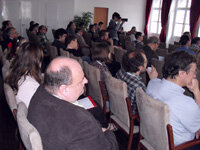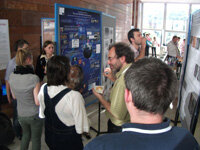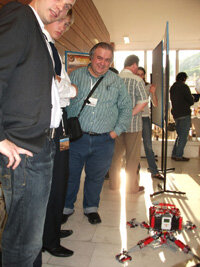Mars meeting strengthens cooperation with Eastern Europe
More than 100 scientists, engineers and university students met in Budapest to strengthen cooperation between Eastern European countries and increase their participation in ESA space projects.
A three-day meeting was organised in Hungary on 5-7 of June, bringing together researchers and engineers working in planetary science across Eastern Europe.
The conference titled ‘Workshop on Mars – Connecting Planetary Scientists in Europe’ was attended by 122 experts from 18 countries to exchange their experiences and ideas, especially in terms of deepening their involvement in the work of the ESA.
ESA’s relationship with Eastern European states is governed by the Plan for European Cooperating States (PECS), which offers a mechanism for interested states to become ‘European Cooperating States’ on the way to full ESA membership.
The workshop was organised by a Hungarian research group called Mars Astrobiology Group, part of Hungary’s PECS agreement. The conference covered wider topics than Mars itself however with many presentations, mostly from PECS groups, concerning planetary science missions in general, data exploitation, detector planning and various engineering issues.

The conference was sponsored by ESA’s Division of Solar System Missions in the Directorate of Science and Robotic Exploration. ESA’s Mars Express project scientist Agustin Chicarro spoke on how various detectors and observing methods help to synthesise our scientific knowledge, using the example of Europe’s first Mars orbiter.
The workshop’s lectures included overview presentations by mission Principal Investigators and short lectures by Eastern European research groups on their own specific fields and latest results.

A clear picture emerged over the course of the conference: high-quality, successful space engineering and scientific work is being performed across the region, concentrated mainly in some very specific topics.
Engineering activity and involvement in planetary missions have done much to establish the relevant scientific background, with PECS projects playing an important role.
Regarding the future, even deeper and wider participation in ESA missions would help to exploit the capacity of researchers and engineers across the Eastern European region, with ESA drawing benefits in turn.

PECS projects need to be continued, as the space-related background knowledge in these countries has developed rapidly but a further transfer of knowhow would result in mutual benefits for ESA too: only a small fraction of engineers and scientists available in the region are working on ESA projects as yet.
The meeting was organised by the Research Centre for Astronomy and Earth Sciences of the Hungarian Academy of Sciences, as well as the Institute for Geological and Geochemical Research and the Konkoly Astronomical Institute. The meeting was also supported by the NEST Foundation, the Karoly Nagy Astronomical Foundation and the Carl Zeiss Technika Ltd.
More information can be found at the conference website: http://www.konkoly.hu/MPSE/




